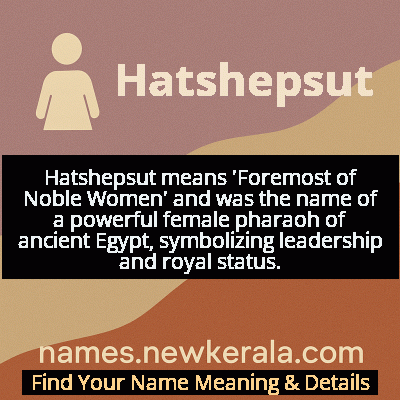Hatshepsut Name Meaning & Details
Origin, Popularity, Numerology Analysis & Name Meaning of Hatshepsut
Discover the origin, meaning, and cultural significance of the name HATSHEPSUT. Delve into its historical roots and explore the lasting impact it has had on communities and traditions.
Name
Hatshepsut
Gender
Female
Origin
Egyptian
Lucky Number
2
Meaning of the Name - Hatshepsut
Hatshepsut means 'Foremost of Noble Women' and was the name of a powerful female pharaoh of ancient Egypt, symbolizing leadership and royal status.
Hatshepsut - Complete Numerology Analysis
Your Numerology Number
Based on Pythagorean Numerology System
Ruling Planet
Moon
Positive Nature
Diplomatic, friendly, artistic, empathetic.
Negative Traits
Over-sensitive, moody, indecisive, prone to self-pity.
Lucky Colours
Green, cream, white.
Lucky Days
Monday.
Lucky Stones
Pearl, moonstone.
Harmony Numbers
1, 3, 4.
Best Suited Professions
Diplomats, mediators, caregivers, artists.
What People Like About You
Cooperative spirit, friendliness, artistic talent.
Famous People Named Hatshepsut
Hatshepsut
Pharaoh of Egypt
Fifth pharaoh of the Eighteenth Dynasty, one of Egypt's most successful rulers who established major trade networks and commissioned hundreds of construction projects
Hatshepsut (Temple Statue)
Ancient Egyptian Monument
The famous seated statue from her mortuary temple at Deir el-Bahari, depicting her in traditional pharaonic regalia including the false beard
Hatshepsut (Historical Figure)
Female Pharaoh
Successfully ruled as pharaoh for over 20 years, challenging gender norms by adopting male titles and representations in official art
Name Variations & International Equivalents
Click on blue names to explore their detailed meanings. Gray names with will be available soon.
Cultural & Historical Significance
Hatshepsut's legacy was nearly erased by her successor Thutmose III, who systematically defaced her monuments, making her rediscovery in modern times particularly significant for understanding gender dynamics in ancient leadership. Her reign demonstrated that women could successfully govern one of the ancient world's most powerful civilizations, challenging modern assumptions about gender roles in antiquity. The extensive trade expedition she sent to Punt brought back exotic goods that enriched Egypt economically and culturally, while her building projects employed thousands and created some of Egypt's most enduring architectural wonders.
Extended Personality Analysis
Individuals named Hatshepsut are often perceived as ambitious, strategic, and visionary leaders with exceptional organizational skills. They typically demonstrate remarkable resilience in overcoming obstacles and challenging traditional boundaries. Like their namesake, they often possess a strong sense of legacy-building and cultural preservation, combined with practical business acumen. These individuals tend to be innovative problem-solvers who aren't afraid to break conventions when necessary.
They often exhibit a unique blend of traditional values with progressive thinking, making them effective in leadership positions where they must balance respect for established systems with the need for change. Their personality often includes a strong artistic sensibility and appreciation for beauty and symmetry in both personal and professional endeavors. People with this name are typically methodical planners who think in long-term strategies rather than short-term gains, and they possess the diplomatic skills necessary to navigate complex social and professional landscapes while maintaining their core objectives and values.
Modern Usage & Popularity
In contemporary times, Hatshepsut remains an extremely rare given name, primarily used by parents with strong interests in Egyptology, ancient history, or who seek a powerful, historically significant name for their daughter. The name appears occasionally in academic circles and among families of Egyptian heritage seeking to connect with their ancient past. While not appearing on mainstream baby name charts, it has gained some recognition through popular media, documentaries, and historical fiction. Modern usage often reflects parents' desire to give their daughters a name symbolizing female empowerment, intelligence, and leadership capabilities. The name's complexity and historical weight make it more common as a middle name or in creative contexts rather than everyday use, though it occasionally surfaces in artistic communities or among parents seeking truly unique names with profound historical resonance.
Symbolic & Spiritual Meanings
Hatshepsut symbolizes female empowerment, strategic leadership, and the breaking of gender barriers. The name represents the idea that women can successfully occupy roles traditionally reserved for men while maintaining their feminine identity. It carries connotations of architectural genius, international diplomacy, and economic prosperity. Symbolically, Hatshepsut embodies the concept of legacy—both in terms of physical monuments and cultural impact. The name also represents resilience against historical erasure and the ultimate triumph of truth over attempted oblivion. In modern contexts, it has become a symbol for women in leadership positions, academic achievement, and cultural preservation. The name evokes images of balance between tradition and innovation, as demonstrated by her ability to maintain Egyptian religious customs while implementing progressive policies that expanded Egypt's influence and prosperity during her remarkable reign.

